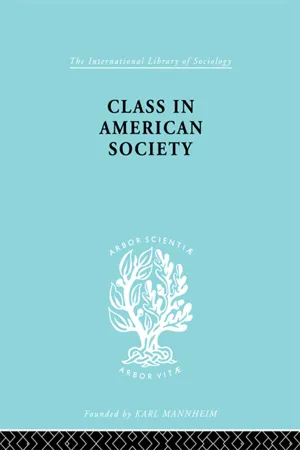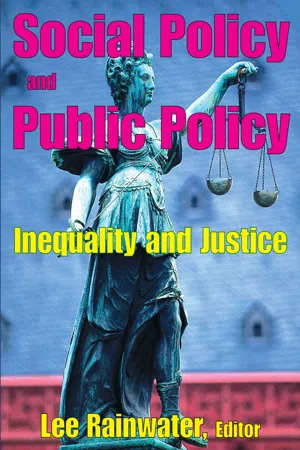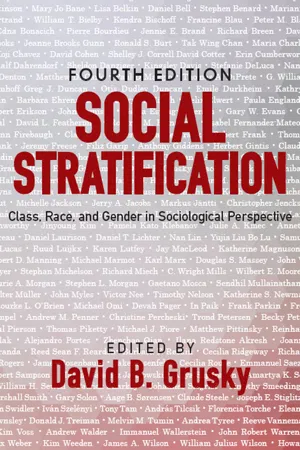Social Sciences
Davis and Moore
Davis and Moore's functionalist theory of stratification posits that social inequality is necessary for the smooth functioning of society. They argue that certain positions in society are more important and require more skill and training, and thus should be rewarded with higher social status and rewards. This theory has been influential in shaping discussions around social inequality and the role of meritocracy in society.
Written by Perlego with AI-assistance
Related key terms
1 of 5
4 Key excerpts on "Davis and Moore"
- eBook - ePub
- Leonard Reissman(Author)
- 2013(Publication Date)
- Routledge(Publisher)
some of the principles of a functional theory of social stratification. Yet the two essays were closely related. Both have begun with the assumption of the functional orientation; essentially, an emphasis upon the functional importance of values for social integration. Both have tried to formulate a theory of stratification at an abstract and general level. Both have more or less shunned the path of concrete characteristics that would have limited the applicability of the theory. Further, both essays have conceded a central importance to stratification as a necessary and basic feature of social organization. The Davis and Moore paper was developed principally by plausible extensions of certain basic assumptions that were inherent in a functional view of society.The first of these assumptions was that stratification was functionally necessary for organized social existence. The assumption was handled as just that; it was not to be proven, but to be used for spelling out some of its implications. The entire intent of the paper was set forth early and the later details could logically be traced back to the key sentence. “As a functioning mechanism a society must somehow distribute its members in social positions and induce them to perform the duties of these positions.”41 Congruent with this requirement was another: society must induce the desire in individuals to fill these positions and to perform the duties connected with them.The second assumption Davis and Moore made was that the social positions in a society were not equal. Socially significant and socially relevant differences between positions were to be expected because the duties associated with those positions would vary as to their social value. Positions would vary then in the importance they were judged to hold for the survival of the society. Secondly, positions would differ by how pleasant or unpleasant were the duties associated with them. Finally, variations would be found in the degree of ability and talent that was required of persons to qualify for the position. These were axiomatic descriptions and generally characteristic of the functional orientation, as the discussion of Parsons’ model should have made clear. Some problems, by no means picayune, are raised by these assumptions and are discussed later in this section. - eBook - ePub
Social Policy and Public Policy
Inequality and Justice
- Lee Rainwater, Yung-Teh Chow(Authors)
- 2017(Publication Date)
- Routledge(Publisher)
Several other writers, among them Marion J. Levy and Bernard Barber, have adopted this theory more or less without modification. But it has been subjected to severe criticism, and despite several thoughtful replies by the original authors, some of the criticisms seem to be gaining ground. The most persistent critic, Melvin M. Tumin, has presented two main arguments against Davis and Moore (in two essays published in 1953 and 1955). The first is that the notion of the “functional importance” of positions is extremely imprecise, and that it probably implies the very differentiation of value that it allegedly explains. The second is that two of the assumptions made by Davis and Moore—that of a harmonious congruence between stratification and the distribution of talent, and that of differential motivation by unequal incentives—are theoretically problematical and empirically uncertain.This second argument was bolstered in 1955 by Richard Schwartz, whose analysis of two Israeli communities showed that it is in fact possible to fill positions adequately without an unequal distribution of social rewards. Buckley charged Davis and Moore in 1958 with confusing differentiation and stratification; unfortunately, however, his legitimate objection to the evaluative undertones of the notion of “functional importance” led in the end to an unpromising terminological dispute. Since then, criticism of the functional theory of stratification has taken two forms. Some critics have followed Dennis Wrong, who in 1959 took up Tumin’s suggestion lhat Davis and Moore had underest’maied the “dysfunctions” of social stratiction—i.e., the disruptive consequences of social inequality; the conservative character of the functional theory has been emphasized even more clearly by Gerhard Lenski. Other critics have raised methodological objections, questioning the value of a discussion of sociological universals that ignores variations observed in the workings of real societies.But the significance of the American debate on stratification is only partly to be found in its subject matter. In this respect, its main conclusion would seem to be that social inequality has many functions and dysfunctions (that is, many consequences for the structure of societies), but that there can be no satisfactory functional explanation of the origin of inequality. This is because every such explanation is bound either to have recourse to dubious assumptions about human nature or to commit the petitio principii - eBook - ePub
Social Stratification
Class, Race, and Gender in Sociological Perspective
- David B. Grusky(Author)
- 2018(Publication Date)
- Routledge(Publisher)
Clearly, the truth or falsity of such an assumption is a strategic question for any general theory of social organization. It is therefore most curious that the basic premises and implications of the assumption have only been most casually explored by American sociologists.The most systematic treatment is to be found in the well-known article by Kingsley Davis and Wilbert Moore, entitled “Some Principles of Stratification.”1 More than twelve years have passed since its publication, and though it is one of the very few treatments of stratification on a high level of generalization, it is difficult to locate a single systematic analysis of its reasoning. It will be the principal concern of this paper to present the beginnings of such an analysis.The central argument advanced by Davis and Moore can be stated in a number of sequential propositions, as follows: 1. Certain positions in any society are functionally more important than others, and require special skills for their performance. 2. Only a limited number of individuals in any society have the talents which can be trained into the skills appropriate to these positions. 3. The conversion of talents into skills involves a training period during which sacrifices of one kind or another are made by those undergoing the training.4. In order to induce the talented persons to undergo these sacrifices and acquire the training, their future positions must carry an inducement value in the form of differential, i.e., privileged and disproportionate access to the scarce and desired rewards which the society has to offer.25. These scarce and desired goods consist of the rights and perquisites attached to, or built into, the positions, and can be classified into those things which contribute to (a) sustenance and comfort, (b) humor and diversion, (c) self-respect and ego expansion.6. This differential access to the basic rewards of the society has as a consequence the differentiation of the prestige and esteem which various strata acquire. This may be said, along with the rights and perquisites, to constitute institutionalized social inequality, i.e., stratification. - eBook - ePub
Families
A Social Class Perspective
- Shirley A. Hill(Author)
- 2011(Publication Date)
- SAGE Publications, Inc(Publisher)
During the mid-twentieth century, structural functionalists proffered a theory of social class inequality that resonated strongly with classical economic theory: They saw it largely as a result of supply and demand and the human capital (e.g., education, skills, intelligence) individuals brought to the labor market. Some positions required more sacrifice, skills, and investment than others and deserved to be better compensated. This idea was articulated in a popular article written by Kingsley Davis and Wilbert Moore in the mid-1940s—an era when few Americans were concerned about the supply of jobs available for those willing to work hard. Davis and Moore (1944) argued that there was a universal necessity for social stratification systems. According to these theorists, social inequality was an “unconsciously devised system” that differentially rewarded workers based on two factors: the importance of their job and, in accordance with the principles of supply and demand, the availability of workers who were willing to fill the position.Social class inequality could become problematic, however, if economic position was based on factors such as inheritance and favoritism rather than merit. Durkheim, for example, believed that the maintenance of social solidarity depended on people being placed in positions that were suited to their abilities and talents (Lehmann 1995). Still, there was little concern among structural functionalists about the relegation of people of color to low-status jobs or the exclusion of women from the labor market. As Jennifer Lehmann has explained, theorists like Durkheim held fairly essentialist views of people of color and women and believed their secondary statuses were consistent with their nature and abilities. Sex role theory dominated, and the focus on the necessity of women as full-time homemakers muted criticism of gender inequality.Structural Functionalism and the Family
Structural functionalism theorized families through the lens of macro-level economic, evolutionary, and developmental forces that were fostering modernity in all institutions. Families were among those social institutions being modernized: The family had lost many of its traditional functions, but it also was taking on new functions. Structural functionalists held that the structure of families should be compatible with their new functions if they were to operate optimally in the urban, industrial society. Talcott Parsons saw the ideal family structure as an isolated nuclear family, a streamlined family devoid of significant extended family ties, and one based on a breadwinner-homemaker division of labor. In the modern capitalist labor market, this gender division of labor freed men to concentrate on occupational success in an increasingly competitive world and women on the nurturing and development of children. This proposed family structure was the basis for sex role theory, which held that men should assume “instrumental” or wage-earning functions in families and women should assume “expressive” functions, or operate in the private arena of family and care for the social-emotional needs of family members (Parsons and Bales 1955). Such a family model was functional in meeting both the economic and emotional needs of family members, and it also reflected the principles of solidarity, interdependence, and democracy. Married men and women were bound together not only by relationships that were based on affection and free choice, but also because they fulfilled different but complimentary functions. Some functionist theorists held that even romantic love itself was a functional necessity, a kind of social glue that evolved to preserve families and the social stratification system.
Index pages curate the most relevant extracts from our library of academic textbooks. They’ve been created using an in-house natural language model (NLM), each adding context and meaning to key research topics.



